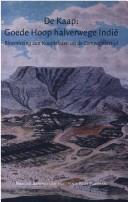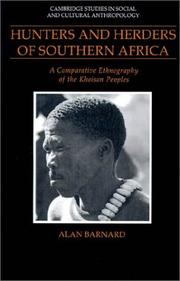| Listing 1 - 4 of 4 |
Sort by
|

ISBN: 9065506888 Year: 2003 Publisher: Hilversum Verloren
Abstract | Keywords | Export | Availability | Bookmark
 Loading...
Loading...Choose an application
- Reference Manager
- EndNote
- RefWorks (Direct export to RefWorks)
Dutch literature --- anno 1600-1699 --- anno 1700-1799 --- Khoikhoi (African people) --- History. --- Hottentot (African people) --- Hottentots --- Khoe (Khoikhoi people) --- Khoi (African people) --- Khoikhoin (African people) --- Ethnology --- Khoisan (African people) --- History --- Cape of Good Hope (South Africa)
Book
ISBN: 1776141822 1776141814 9781776141814 1776141806 9781776141807 Year: 2017 Publisher: Johannesburg Wits University Press
Abstract | Keywords | Export | Availability | Bookmark
 Loading...
Loading...Choose an application
- Reference Manager
- EndNote
- RefWorks (Direct export to RefWorks)
The Khoesan were the first people in Africa to undergo the full rigours of European colonisation. By the early nineteenth century, they had largely been brought under colonial rule, dispossessed of their land and stock, and forced to work as labourers for farmers of European descent. Nevertheless, a portion of them were able to regain a degree of freedom and maintain their independence by taking refuge in the mission stations of the Western and Eastern Cape, most notably in the Kat River valley. For much of the nineteenth century, these Khoesan people kept up a steady commentary on, and intervention in, the course of politics in the Cape Colony. Through petitions, speeches at meetings, letters to the newspapers and correspondence between themselves, the Cape Khoesan articulated a continuous critique of the oppressions of colonialism, always stressing the need for equality before the law, as well as their opposition to attempts to limit their freedom of movement through vagrancy legislation and related measures. This was accompanied by a well-grounded distrust, in particular, of the British settlers of the Eastern Cape and a concomitant hope, rarely realised, in the benevolence of the British government in London. Comprising 98 of these texts, These Oppressions Won't Cease - an utterance expressed by Willem Uithaalder, commander of Khoe rebel forces in the war of 1850-3 - contains the essential documents of Khoesan political thought in the nineteenth century. These texts of the Khoesan provide a history of resistance to colonial oppression which has largely faded from view. Robert Ross, the eminent historian of precolonial South Africa, brings back their voices from the annals of the archive, voices which were formative in the establishment of black nationalism in South Africa, but which have long been silenced.
Khoikhoi (African people) --- Hottentot (African people) --- Hottentots --- Khoe (Khoikhoi people) --- Khoi (African people) --- Khoikhoin (African people) --- Ethnology --- Khoisan (African people) --- History --- Cape of Good Hope (South Africa) --- Sources. --- Politics and government --- Political activity --- South Africa --- Colonization --- History. --- Africa, South
Book
ISBN: 9781107337039 9781107042490 9781107616578 9781107598676 1107598672 9781107692923 110769292X 1107337038 9781107703971 1107703972 1107042496 1139894862 1107703158 1107701953 1107670039 1107616573 Year: 2013 Publisher: New York
Abstract | Keywords | Export | Availability | Bookmark
 Loading...
Loading...Choose an application
- Reference Manager
- EndNote
- RefWorks (Direct export to RefWorks)
This book provides a detailed narrative of the Kat River Settlement in the Eastern Cape of South Africa during the nineteenth century. The settlement was created by the British to use the Khoekhoe as a living barrier between the Cape Colony and the amaXhosa. It was fought over with some regularity, however, and finally broken up after some of the Khoekhoe joined the amaXhosa in their war against the colony. Nevertheless, in the time that the settlement existed, the Khoekhoe both created a fertile landscape in the valley and developed a political theology of great importance for the evolution of South Africa. They were also the subjects of - and participants in - the major debates leading to the introduction of a liberal constitution for the Cape in 1853. The history of the settlement is thus crucial in understanding the development of both colonial racism and the creation of the colony's non-racial democracy.
Khoikhoi (African people) --- Xhosa (African people) --- Amaxosa (African people) --- Kāpiri (African people) --- Koosa (African people) --- Xosa --- Xosa (African people) --- Ethnology --- Nguni (African people) --- Hottentot (African people) --- Hottentots --- Khoe (Khoikhoi people) --- Khoi (African people) --- Khoikhoin (African people) --- Khoisan (African people) --- History. --- Kat River Valley (South Africa) --- South Africa --- Kat Valley (South Africa) --- Race relations --- Political aspects. --- History --- Arts and Humanities

ISBN: 0521411882 0521428653 1139166506 9780521428651 9780521411882 Year: 1992 Volume: 85 Publisher: Cambridge : Cambridge University Press,
Abstract | Keywords | Export | Availability | Bookmark
 Loading...
Loading...Choose an application
- Reference Manager
- EndNote
- RefWorks (Direct export to RefWorks)
The Khoisan are a cluster of southern African peoples, including the famous Bushmen or San 'hunters', the Khoekhoe 'herders' (in the past called 'Hottentots'), and the Damara, also a herding people. Most Khoisan live in the Kalahari desert and surrounding areas of Botswana and Namibia. In spite of differences in their way of life, the various groups have much in common, and this book explores these similarities and the influence of environment and history on aspects of Khoisan culture. This is the first book on the Khoisan as a whole since the publication in 1930 of The Khoisan Peoples of South Africa, by Isaac Schapera, doyen of southern African studies.
Bushmen (African tribe) --- Khoikhoi (African people) --- Khoikhoi (Afrikaans volk) --- Khoikhoi (Peuple africain) --- San (African people) --- San (Afrikaans volk) --- San (Peuple africain) --- Khoikhoi (peuple d'Afrique) --- San (Peuple d'Afrique) --- Khoisan (African people) --- Khoisan (African people). --- Khoi-San (African people) --- Ethnology --- Social Sciences --- Anthropology --- Basarwa (African people) --- Bushmen --- Bushmen (African people) --- /Xam (African people) --- Hottentot (African people) --- Hottentots --- Khoe (Khoikhoi people) --- Khoi (African people) --- Khoikhoin (African people)
| Listing 1 - 4 of 4 |
Sort by
|

 Search
Search Feedback
Feedback About UniCat
About UniCat  Help
Help News
News